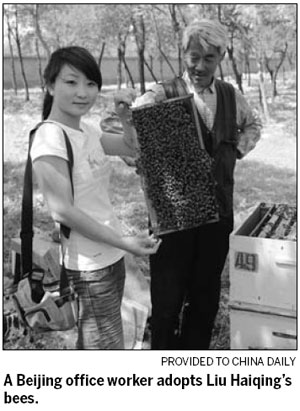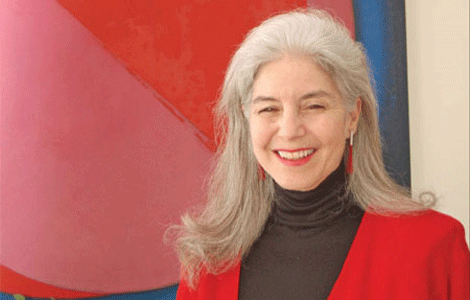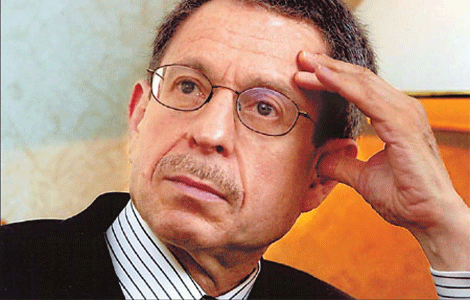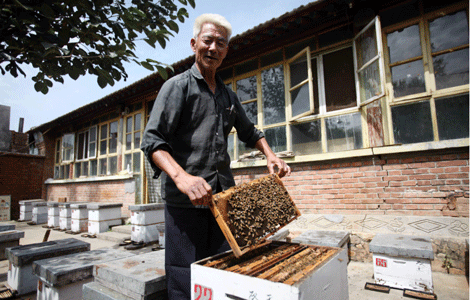Society
Sweet success
Updated: 2011-09-07 07:42
By Wang Kaihao (China Daily)
|
Liu Haiqing, 61, from Pinggu, Beijing, has been a beekeeper for more than 40 years. [Wang Jing / China Daily] |
A program that encourages city residents to sponsor beehives in the outskirts of Beijing has benefits for all. Wang Kaihao reports.
A verdant valley in Pinggu district, on the outskirts of north Beijing, is attracting both bees and city slickers following a new initiative. Liu Haiqing, a 61-year-old villager in Weitaiwu village, has been a bee farmer since 1967. He used to be one of 17 bee farmers in his village, but now there are just four as urban spread impacts on the environment and youngsters choose other careers.
The good news is that city dwellers are coming to the valley in order to adopt the beehives.
Zhang Qingyong, chief executive officer of Filmore Media, initiated the project in April.
 |
"Bees symbolize harmony, diligence, cooperation and teamwork, which are all crucial for the management of an enterprise," he says. "That's one reason why I began this campaign - to teach myself how to run my business better."
"I was born and grew up in the countryside, in Jilin province, and I believe that city types find happiness elusive because of constant pressure," the 39-year-old says.
"I hope that adopting bees can bring us closer to nature and put us in touch with the joyful feelings of our childhood again."
According to Zhang's survey, there are 200,000 beehives around Beijing. Zhang anticipates 60,000 more within five years.
Liu, who tends to about 70 beehives, says he is too old to follow the bees around the country, as others do, but is nevertheless happy with his work.
Liu was encouraged to continue his career as a beekeeper about two years ago because Beijing municipal government offers an annual subsidy of 80 yuan ($12) per hive.
His net annual income a year is more than 30,000 yuan ($4,638) and he expects it to further increase as city dwellers swarm to adopt a hive.
He says his son-in-law has decided to become a beekeeper too.
"Beekeeping requires innovative management," Liu says. "The technology will improve as more people take part and then the yield of honey will increase."
Han Wei, the manager of the apiary where Liu works, says more than 200 adopters have signed contracts to lease beehives at an annual cost of 1,000 yuan ($155), and each adopter will get 27 bottles of honey a year, each weighing 455 grams.
Lu Ming from an insurance company has been drinking honey for six years. She has adopted a hive on a five-year lease.
"There are healthcare products but most of them are expensive and I doubt whether they really work. Honey is much cheaper and more natural."
Lu says honey helped her overcome endocrine dyspraxia, after she gave birth to a child. Nevertheless, she previously only bought imported honey.
 |
"Safety is a major concern when I choose honey at the supermarket," Lu says. "Many honey products are adulterated or fake. It reassures me to own a private hive that I can keep an eye on."
She regularly takes her child to the apiary in Pinggu, which she says is "a great chance for a kid to get so close to nature".
Though she regularly drinks honey, Lu says she can't consume more than five bottles a year. Like other hive adopters, she gives the rest to friends as gifts.
"It used to bother me trying to find friends suitable gifts," says Xi Zitong, a financier who has adopted hives for 10 years. "Honey is a brilliant gift now that people are so concerned with health."
"This campaign is a great project since it attracts attention and benefits bees," Xi adds. "It's also charity for us because crops, fruits and vegetables are tastier when pollen is spread by bees rather than machines."
A hive can hold about 30,000 bees, whose sphere of activity covers an area of approximately 7.8 square kilometers, pollinating flowers.
Though Han, the manager, says most of the adopters are individuals and the program has yet spread to several major potential markets like universities and retirees, there has been interest elsewhere.
Liu Chunjie, the head of Chunjie Psychological Consultation Center, adopted a hive for five years in June, in the name of her company, and became the first organization to do so.
"I joined the project out of curiosity," Liu says. "But it has turned out to be very meaningful, as psychological consultation is established on benevolence and patience, and those are the qualities we can learn from bees.
"We have the added bonus that the honey can help cure insomnia, which many of our clients suffer from."
E-paper

Unveiling hidden treasures
The Forbidden City, after the Great Wall, is the most recognized tourist site in China.
Short and sweet
Game for growth
Character reference
Specials

China at her fingertips
Veteran US-China relations expert says bilateral ties have withstood the test of time

The myth buster
An outsider's look at china's leaders is updated and expanded

China in vogue
How Country captured the fascination of the world's most powerful fashion player

